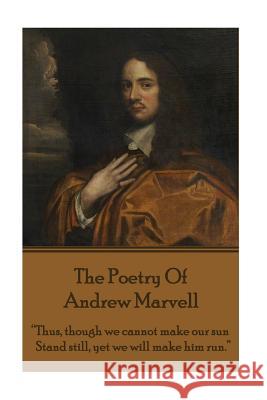The Poetry Of Andrew Marvell: "Thus, though we cannot make our sun, Stand still, yet we will make him run." » książka
The Poetry Of Andrew Marvell: "Thus, though we cannot make our sun, Stand still, yet we will make him run."
ISBN-13: 9781783942251 / Angielski / Miękka / 2017 / 124 str.
The Poetry Of Andrew Marvell: "Thus, though we cannot make our sun, Stand still, yet we will make him run."
ISBN-13: 9781783942251 / Angielski / Miękka / 2017 / 124 str.
(netto: 38,81 VAT: 5%)
Najniższa cena z 30 dni: 40,65
ok. 16-18 dni roboczych.
Darmowa dostawa!
In 1661 Marvell was re-elected MP for Hull in the Cavalier Parliament. He eventually came to write several long and bitterly satirical verses against the corruption of the court. Although circulated in manuscript form, some finding anonymous publication in print, they were too politically sensitive and thus dangerous to be published under his name until well after his death. Marvell took up opposition to the 'court party', and satirised them anonymously. In his longest verse satire, Last Instructions to a Painter, written in 1667, Marvell responded to the political corruption that had contributed to English failures during the Second Anglo-Dutch War. From 1659 until his death in 1678, Marvell was serving as London agent for the Hull Trinity House, a shipmasters' guild. He travelled on their behalf to the Dutch Republic and Russia, Sweden, and Denmark. He died suddenly on August 16th, 1678, while in attendance at a popular meeting of his old constituents at Hull. His health had been remarkably good; and it was speculated that he was poisoned by political or clerical enemies. Marvell was buried in the church of St Giles in the Fields in central London. His monument, erected by his grateful constituency, bears the following inscription: Near this place lyeth the body of Andrew Marvell, Esq., a man so endowed by Nature, so improved by Education, Study, and Travel, so consummated by Experience, that, joining the peculiar graces of Wit and Learning, with a singular penetration and strength of judgment; and exercising all these in the whole course of his life, with an unutterable steadiness in the ways of Virtue, he became the ornament and example of his age, beloved by good men, feared by bad, admired by all, though imitated by few; and scarce paralleled by any. But a Tombstone can neither contain his character, nor is Marble necessary to transmit it to posterity; it is engraved in the minds of this generation, and will be always legible in his inimitable writings, nevertheless. He having served twenty years successfully in Parliament, and that with such Wisdom, Dexterity, and Courage, as becomes a true Patriot, the town of Kingston-upon-Hull, from whence he was deputed to that Assembly, lamenting in his death the public loss, have erected this Monument of their Grief and their Gratitude, 1688.











